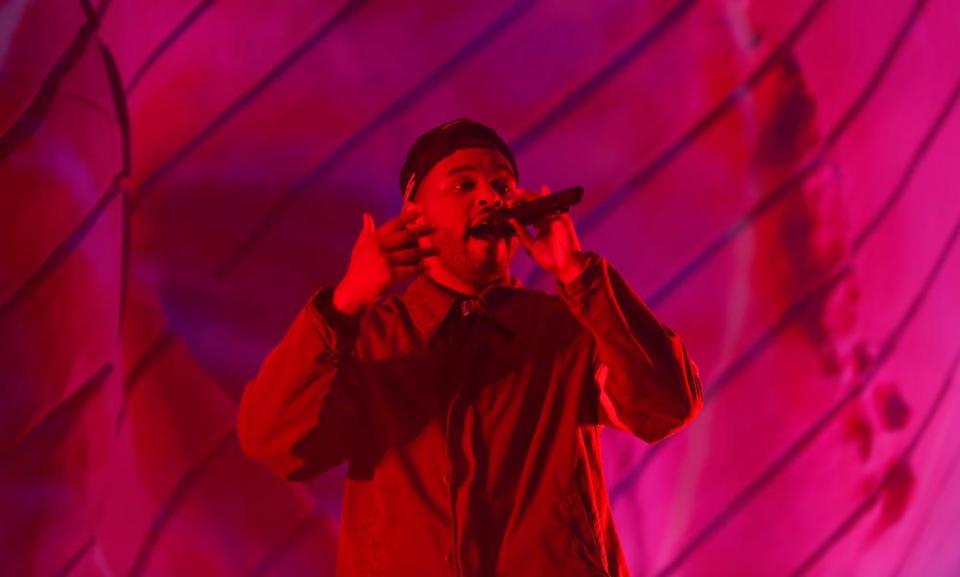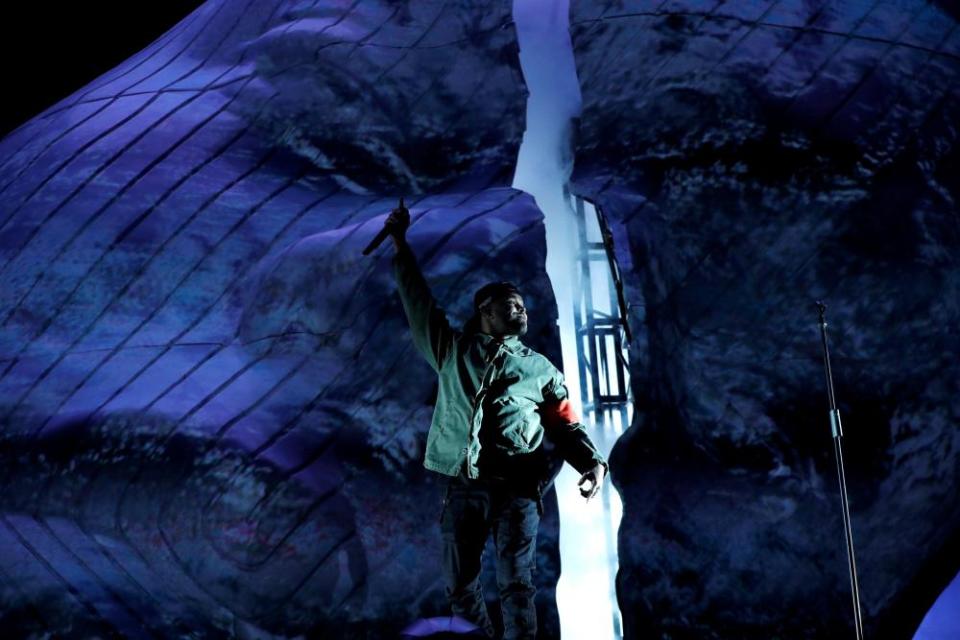The Weeknd at Coachella review – slick but edgeless emo R&B
The first headliner set of this year’s festival was an exhaustive sampling of the artist’s back catalogue that felt effortless yet devoid of genuine highs

To see the gurns on teens, swaying couples and squads of young women around the Empire Polo Club for The Weeknd’s crossover hit Can’t Feel My Face is to realise that the one-man boyband has written the perfect arc for his six-year career.
During his first headline Friday night set at Coachella, he follows that world-class Michael Jackson-aping jam mid-set with another smash: I Feel It Coming. Both prove why The Weeknd (real name Abel Tesfaye) is the ideal opening headliner for a Coachella dominated by mainstream hip-hop and R&B. Five years ago though, his positioning on top would have been less likely when he was a shadowy, interview-shy internet figure singing over-sexualised songs about outsiderdom.
Yet on this night he leads the pack, establishing his pivotal role in influencing the dark emo sound of contemporary R&B heard in nightclubs, radio stations and high street stores the world over. He does so as when he began: alone, but now as a legitimate, albeit still understated and relatable superstar. You could say The Weeknd’s been something of a trojan horse, a gateway drug, sneakily updating the notion of 90s cheeseball crooning by dressing it up as some cool, mysterious jigsaw puzzle for the 2010s.
At Coachella he’s not hiding, taking the stage solo with a backing band for a set that featured no guests, frills, outfit changes or tricks (bar a final explosion of fireworks). Beginning at almost midnight he comes out blazing with a one-two punch of two of his most recognisable anthems: Pray For Me (from the Black Panther soundtrack) and Starboy. It’s a defiantly bold entrance. The fact he didn’t invite his usual Pray For Me sparring partner Kendrick Lamar out (Lamar was only just on stage moments before as a guest for opening act SZA) speaks to his intention to dominate the night as the loner figure he’s always played.
His figure is dwarfed by an enormous statue of a fallen man’s face behind him, a symbol of the shame, self-doubt and self-loathing that forms the backbone of the majority of his lyrical content. He stalks the length of his platform, holding his mic stand for dear life all night, scrunching his face to his bassy productions and vocal hysterics. In a casual backwards hat and khaki jacket, he lets the glitchy psychedelic backdrops of the TV screens behind him provide the colour, small in stature by comparison.
There’s nothing casual or small about his bravado though, the opposite of the insecure guy he once was. As he – joined by the crowd – delivers the line “I’m a motherfucking starboy” he’s completely possessed by his own positioning as a chart-topping, global success story. There’s no fronting about the fact that he has the look, the ease and the voice. He does everything he’s supposed to do but it feels somewhat edgeless.

The treat for his original fans here (“my OG’s”) is in his cherrypicking of his whole back catalogue during an extensive, stamina-requiring 23-song set. The skittering beats of his original productions are accompanied by affected autotuned vocals and a dangerous ambiance on crowd pleasers such as Crew Love, The Morning and Wicked Games.
Five years ago his emo treatment of R&B felt out-of-leftfield. When he belts out his bigger, streamlined hits Earned It (of Fifty Shades Of Grey fame), Party Monster and Often, you realise how commonplace that expression of male vulnerability has become. A once shy, internet-confined bedroom producer took an underground concern overground, and tonight he is celebrating.
Whether he is singing about women getting paid or bitches getting laid, the young female members of the crowd mimic every line at him when he cries “sing that shit!” at them. The crowd unleashes their first ball of pent-up energy for House Of Balloons/Glass Table Girls, from his first mixtape, hollering his Siouxsie & The Banshees-sampling chorus back at him.
Peppering his set with covers of Belly’s Might Not, Ty Dolla $ign’s Or Nah and Future’s Low Life, it’s the latter that sends his message across. “You love me for that low life,” he croons, glorifying that next-to-nothing existence, reminding you of the solitary world he emerged from. It’s that loneliness that’s spoken to a generation through the internet, uniting them. Now the connection is universal in a field full of pill-popping, margarita-swilling millennials. The Weeknd, their king, can relish in his glory.
“I love you too baby thank you,” he says, charming the masses. “You guys are beautiful.” In the final third he gives a performance of ballad Call Out My Name from his newly released mini album My Dear Melancholy. Twitter thinks he’s crying. Maybe it was the sweat of one man’s marathon performance. “We found each other, I helped you out of a broken place,” he sings about a past relationship that went awry. Translated here, it could easily be an ode to this crowd instead, providing a twisted mantra for an impending weekend of bad behaviour filled with regrets, mistakes and many numb faces.
